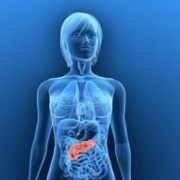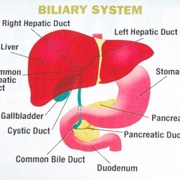 Photo: Getty Images
Photo: Getty Images
Pancreatic cancer is one of the most difficult to treat. Reference 1 reported “numbers for incidence and mortality are still practically identical”; that is, almost everyone who is diagnosed eventually dies from this cancer. Risk factors include high-fat diet, chronic or hereditary pancreatitis (inflammation of the pancreas), family history, diabetes mellitus, and primary sclerosing cholangitis (inflammation of the bile duct). Women have a lower risk than men, but according to statistics from the American Cancer Society, pancreas cancer is still a leading cause of cancer death in females. Only lung, breast, and colorectal cancer kill more American women.
Surgical resection is currently the only treatment that offers a complete cure. Unfortunately, only a small fraction of patients are diagnosed early enough for this. Reference 2 reported that 5 to 22 percent of pancreatic cancers are resectable when they are discovered. The five-year survival rate is currently 29 percent for patients with resectable tumors, and much less for those who are not surgical candidates. Reference 2 recommended more large phase 3 trials for chemotherapy as an adjuvant treatment for those who have surgery. Pancreas cancer has a high probability of recurrence, and spreads easily outside the pancreas.
However, other treatments are available for unresectable cancer. These include palliative surgery, chemotherapy, radiotherapy, radioactive iodine seed implantation, and radiofrequency ablation. The radioactive iodine seeds are familiar to many as a treatment for prostate cancer. Radiofrequency ablation (RFA) is a technique for killing tumor cells with heat. Reference 4 shows the instrument used for RFA and provides background information.
A Chinese research team recently reported good results from a study of combined intraoperative radiofrequency ablation and iodine seed implantation. For 32 patients with stage 3 or 4 pancreas cancer treated with these techniques, the median survival time was 17.5 months. One patient was still alive at 33 months, when the paper was written. Patients with stage 3 cancer had better results than those with the more advanced stage 4 disease.
In the United States, pancreatic cancer is a topic of intense research efforts. I found 1039 studies currently listed at http://clinicaltrials.gov.
References:
1. Krejs GJ, “Pancreatic cancer: epidemiology and risk factors”, Dig Dis. 2010; 28(2): 355-8.
2. Reni M, “Neoadjuvant treatment for resectable pancreatic cancer: time for phase III testing?” World J Gastroenterol 2010 Oct 21; 16(39): 4883-7.
3. Zou YP et al, “Intraoperative radiofrequency ablation combined with 125iodine seed implantation for unresectable pancreatic cancer”, World J Gastroenterol 2010 Oct 28; 16(40): 5104-110.
4. Cancer statistics online:
http://www.cancer.org/acs/groups/content/@epidemiologysurveilance/documents/document/acspc-026238.pdf
5. Radiofrequency ablation:
http://www.angiodynamics.com/products/uniblate
Linda Fugate is a scientist and writer in Austin, Texas. She has a Ph.D. in Physics and an M.S. in Macromolecular Science and Engineering. Her background includes academic and industrial research in materials science. She currently writes song lyrics and health articles.






Add a CommentComments
There are no comments yet. Be the first one and get the conversation started!